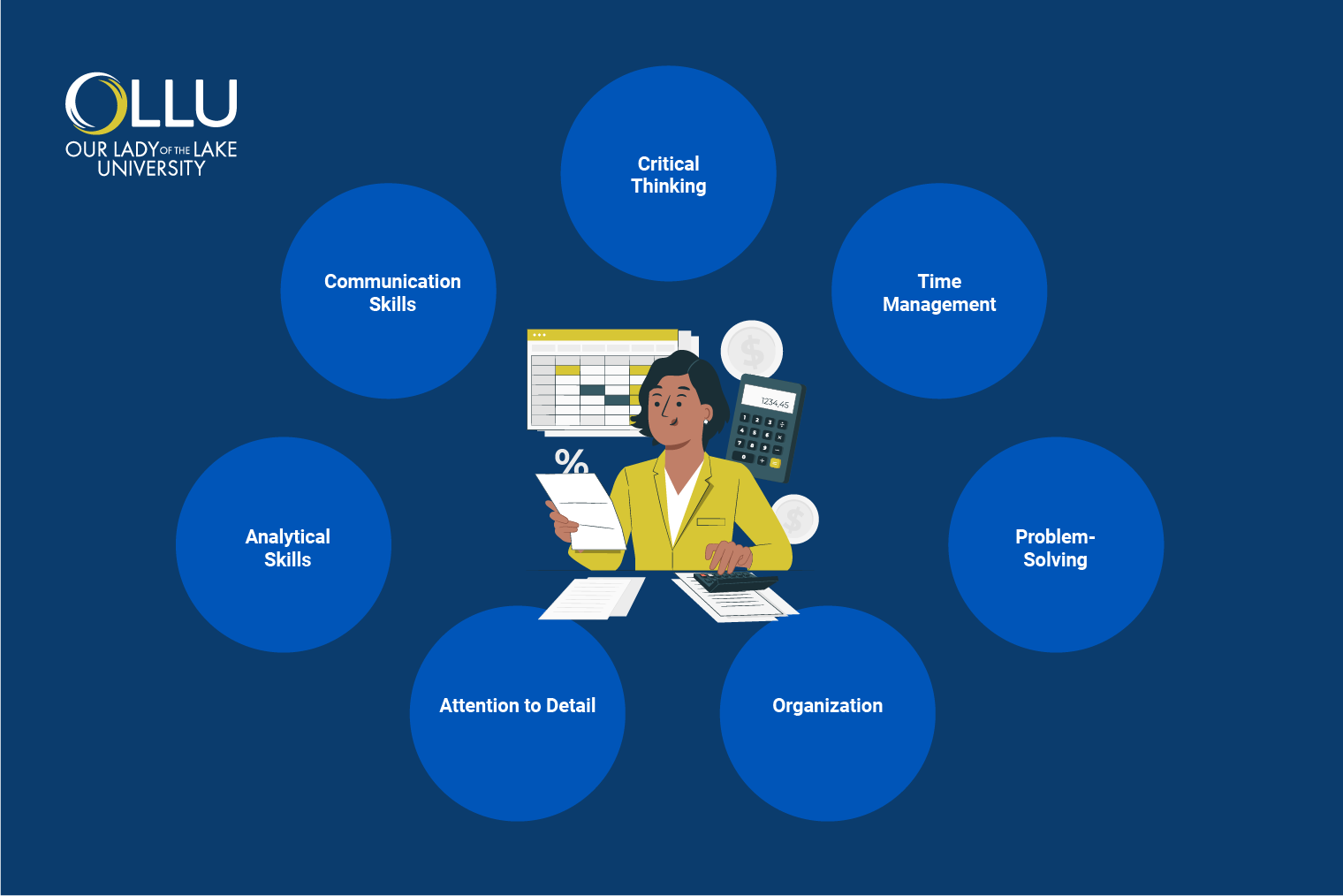Top 9 Skills of an Accountant
May 27, 2024

Accounting is a field that demands a mix of specific technical and soft skills for
success. Technical skills are crucial for handling detailed financial tasks accurately,
while soft skills, which help accountants manage challenges, work well with teams,
and adjust to industry changes, are equally important. Mastering both sets of skills
is essential for any individual looking to excel and progress in their accounting career path.
This blog post covers all of the above. So, join us to explore the essential skills of an accountant and see how you can benefit from them.
5 Technical Skills in Accounting
In terms of accountant qualifications and skills, technical prowess plays an important role. Financial reporting, tax preparation, audit and compliance, cost management, and forensic accounting are among the top technical skills that any accountant must possess.
Financial Reporting
Financial reporting is a crucial accounting skill that involves creating accurate and timely financial statements like balance sheets, income statements, and cash flow statements.
It requires a deep understanding of accounting principles and strict adherence to regulations and standards such as GAAP (Generally Accepted Accounting Principles) or IFRS (International Financial Reporting Standards).
Mastery of these skills ensures that the financial information provided reflects the true financial position of a company, supporting effective decision-making and compliance with legal requirements.
Tax Preparation
Tax preparation is about calculating and filing tax returns for individuals, businesses, and organizations.
It involves understanding and applying the latest tax laws and accurately claiming deductions and credits to minimize liabilities and ensure compliance with regulations.
Staying updated on these laws and requirements is crucial for tax preparers to provide practical advice and avoid legal issues, making this skill essential for maintaining financial health and legal standing for clients or employers.
Audit and Compliance
Audit and compliance involve conducting internal or external reviews of financial records to ensure their accuracy, transparency, and adherence to regulations.
This skill requires meticulously analyzing financial documents to spot discrepancies or errors and then implementing actions to resolve these issues. Effective auditing helps organizations maintain integrity, avoid legal penalties, and enhance financial practices by ensuring that all financial operations are carried out according to established standards and laws.
Cost Management
Cost management is the ability to analyze costs, expenses, and deviations from budgets to boost efficiency and profitability. This skill is critical for developing strategies that control costs, accurately forecasting financial results, and optimizing the allocation of resources.
Effective cost management allows organizations to identify and avoid unnecessary expenses to boost overall financial health. This way, businesses can make informed decisions that lead to sustainable growth.
Forensic Accounting
Much like the name suggests, forensic accounting is the use of accounting skills to investigate financial crimes like fraud and embezzlement.
This area involves conducting detailed forensic audits, where accountants analyze financial records to uncover any signs of illegal activity.
Forensic accountants are skilled in digging deep into financial data to find discrepancies and evidence of misconduct. They play a crucial role in legal proceedings by presenting their findings clearly and convincingly to support cases in court. This specialty blends accounting expertise with investigative tactics to protect businesses and bring wrongdoers to justice.
9 Accountant Skills You Must Have

While having technical skills as an accountant is indeed crucial, one must also demonstrate
ownership of certain soft skills to ensure success in this field. Below, we list the
top 9 accounting skills that can get you far.
Communication Skills
Communication skills are essential in accounting for effectively conveying financial information to stakeholders, clients, or team members. These skills include writing clear reports, delivering oral presentations, and actively listening to feedback or queries.
Good communication ensures that all complex financial data are understood, facilitating informed decision-making and collaboration. It also helps build trust and maintain strong working relationships, which are vital for success in any business environment.
Critical Thinking
Critical thinking in accounting is crucial for analyzing complex financial data to identify patterns and make informed decisions. This skill enables accountants to evaluate risks, assess different alternatives, and propose practical solutions to financial challenges.
With critical thinking abilities, accountants can navigate through financial complexities, anticipate potential issues, and develop strategies that enhance business performance and stability. This approach is essential for maintaining financial integrity and achieving long-term success in the dynamic business landscape.
Time Management
Another important skill to have is time management, especially for managing workloads effectively. This skill involves techniques like setting clear goals, prioritizing various tasks based on urgency and importance, and delegating responsibilities when appropriate.
Effective time management helps accountants stay organized and productive, ensuring that all financial tasks are completed accurately and on time. By mastering these techniques, accountants can handle the pressures of busy financial cycles and maintain high standards of work.
Analytical Skills
Having analytical skills means being able to interpret financial data effectively. This skill encompasses data analysis, financial modeling, and quantitative reasoning. By employing these techniques, accountants can understand past performance, predict future outcomes, and make informed strategic decisions.
This process not only aids in guiding business strategy but also helps in managing risks and discovering opportunities for growth, making it essential for accountants to master these skills to contribute effectively to their organizations.
Organization
Organization is key in accounting, as it involves maintaining orderly and accessible financial records, files, and documents. This skill requires proficient file management, meticulous data organization, and consistent recordkeeping.
Keeping financial information well-organized is crucial for accurate reporting, timely audits, and compliance with regulations. It also enables quick access to data when making financial decisions or responding to inquiries. Effective organization helps prevent errors and enhances efficiency, making it an essential practice for any accountant.
Problem-Solving
Problem-solving is also a crucial skill in accounting. It includes identifying financial problems, considering different solutions, and implementing the best ones to maintain accuracy and compliance. For instance, accountants often reconcile differences in financial statements or address audit issues.
This skill demands a deep knowledge of financial systems and critical thinking to fix mistakes and inefficiencies. Effective problem-solving ensures the accuracy of financial data, aids in making business decisions, and helps the organization follow financial rules and standards.
Attention to Detail
Attention to detail is highly relevant in accounting to ensure accuracy and precision in tasks like data entry, reconciliation, and financial reporting. Techniques to maintain high levels of accuracy include double-checking calculations, thoroughly reviewing documents, and implementing systematic review processes.
This meticulous approach prevents errors and discrepancies, which are critical in maintaining the financial integrity of an organization. Ensuring each figure is correct and every financial statement is accurate supports reliable decision-making and compliance with regulatory standards.
Proficiency in Accounting Software
Proficiency in accounting software, such as QuickBooks, Xero, or SAP, is paramount. These programs assist in everything from basic bookkeeping to complex financial reporting. Being skilled in these tools means understanding their features, staying current with upgrades, and keeping up with new trends in the industry.
This not only enhances productivity but also ensures accuracy in financial management. Continual learning and adaptation to new software developments are crucial for accountants to remain effective and competitive in their field.
Adaptability
Being able to adjust to changes in regulations, technology, and business environments is highly significant in accounting.
This skill is critical for accountants who must stay current with new laws, embrace cutting-edge technologies, and adapt strategies to meet changing business demands. Being adaptable involves continuously learning new skills, accepting innovations, and responding effectively to new challenges.
This flexibility helps accountants ensure compliance, optimize financial processes, and support their organization's growth in a dynamic economic landscape.
Conclusion
In the dynamic field of accounting, one must possess a unique blend of technical and soft skills for guaranteed success. Mastering audit and compliance and forensics accounting helps accountants identify frauds and adhere to regulations for maintaining legal activity. Skills like time management, problem-solving, and organizational skills, on the other hand, ensure a smooth working pace. Both combined help accountants thrive.
Ready to advance your accounting skills and stay ahead in your field? Consider our Master of Science in Accounting and explore many opportunities for growth.
Frequently Asked Questions (FAQs):
How can I enhance my accounting skills?
Enhance your accounting skills by regularly updating your knowledge through professional courses, staying current with industry software updates, and gaining practical experience through internships or volunteer work.
What skills does an entry-level accountant need?
An entry-level accountant needs knowledge of basic accounting principles, proficiency in accounting software, and soft skills like communication, organization, and attention to detail.
Is accounting a good career path?
Yes, accounting is a good career path as it offers stability, a clear professional progression, opportunities in a wide range of industries, and the potential for lucrative salaries as experience and skills develop.